
- Homepage
- Features
- Antique (15)
- Antique, Solid Body (7)
- Autographed (11)
- Decorative (9)
- Framed (217)
- Framed, Signed (47)
- Gilded (13)
- Hand Painted (22)
- Handcarved (27)
- Handpainted (47)
- Handpainted, Signed (17)
- Matted (7)
- Numbered (6)
- One Of A Kind (ooak) (18)
- Pair (138)
- Pair, Updated Wiring (52)
- Salvage (5)
- Signed (359)
- Signed, Framed (11)
- Solid Body (19)
- ... (2229)
- Item Height
- Item Length
- Item Width
- Listed By
- Title
Pair of German Michael Thonet Tall Back Bentwood Chairs, Signed, 20th Century
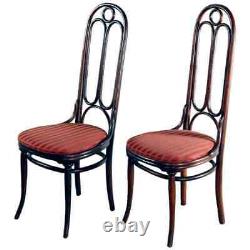
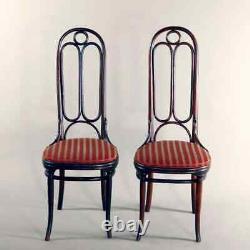
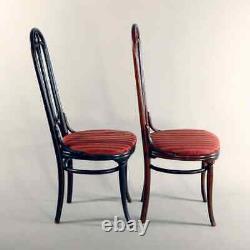

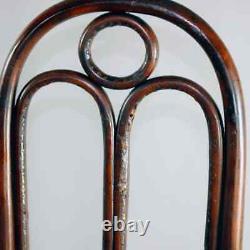


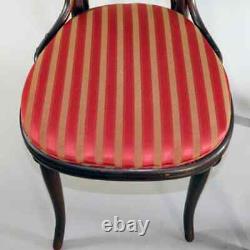
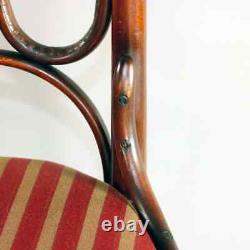
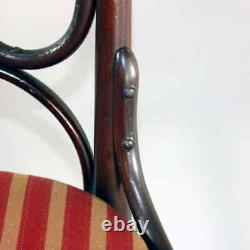
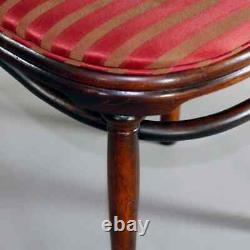
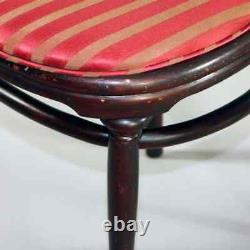


Pair of German Michael Thonet Tall Back Bentwood Chairs, Signed, 20th Century. A pair of German antique chairs by Michael Thonet offer tall back bentwood frame chairs offer tall backs and upholstered seats, signed Thonet, circa 1900. Overall very good condition, tight, sturdy and newly upholstered.
Wear consistent with age and use. Measures: 46.25" H x 19.75" W x 18" D, 19" seat H. Additional information: Michael Thonet (2 July 1796-3 March 1871) was a German-Austrian cabinet maker, known for the invention of bentwood furniture. Thonet was the son of the master tanner Franz Anton Thonet of Boppard.
Following a carpenter's apprenticeship, Thonet set himself up as an independent cabinetmaker in 1819. A year later, he married Anna Grahs, with whom he had seven sons and six daughters. Only five of the sons, however, survived early childhood. In the 1830s, Thonet began trying to make furniture out of glued and bent wooden slats.His first success was the Bopparder Schichtholzstuhl (Boppard layerwood chair) in 1836. Thonet gained substantial independence by acquiring the Michelsmühle, the glue factory that made the glue for this process, in 1837. However, his attempts to patent the technology failed in Germany (1840) as well as in Great Britain, France and Russia (1841).
Thonet's essential breakthrough was his success in having light, strong wood bent into curved, graceful shapes by forming the wood in hot steam. This enabled him to design entirely novel, elegant, lightweight, durable and comfortable furniture, which appealed strongly to fashion - a complete departure from the heavy, carved designs of the past - and whose aesthetic and functional appeal remains to this day.At the Koblenz trade fair of 1841, Thonet met Prince Klemens Wenzel von Metternich, who was enthusiastic about Thonet's furniture and invited him to the Vienna court. In the next year, Thonet was able to present his furniture, and his chairs in particular, to the Imperial Family.
There, he worked with his sons on the interior decoration of the Stadtpalais Liechtenstein for the Carl Leistler establishment. [1] In 1849, he again opened his own shop together with his four sons.
A few years later, in 1853, he transferred the company to his sons under the name Gebrüder Thonet. In 1850 he produced his Nr 1 chair. The Great Exhibition in London 1851 saw him receive the bronze medal for his Vienna bentwood chairs. This was his international breakthrough. At the next World's Fair, Exposition Universelle in Paris 1855, he was awarded the silver medal as he continued to improve his production methods. In 1856 he was able to open up a new factory in Korycany, Moravia. Its extensive beech woods were of great significance to his enterprise. 14 - better known as Konsumstuhl Nr. 14, coffee shop chair no. 14 - is still called the "chair of chairs" with some 50 million produced and still in production today. [1] The innovative bending technique allowed for the Industrial Production of a chair for the first time ever.What was revolutionary about the former no. 14, which is todays no. 214, was the fact that it could be disassembled into a few components and thus produced in work-sharing processes. The chair could be exported to all nations of the world in simple, space saving packages: 36 disassembled chairs could fit into a one cubic meter box. [2] It yielded a Gold Medal for Thonet's enterprise at the 1867 Paris World's Fair.
The item "Pair of German Michael Thonet Tall Back Bentwood Chairs, Signed, 20th Century" is in sale since Monday, May 11, 2020. This item is in the category "Antiques\Furniture\Chairs\1900-1950".
The seller is "antiquerevivalone" and is located in Big Flats, New York. This item can be shipped to United States.
- Region of Origin: Germany
- Depth: 18"
- Maker: Michael Thonet
- Width: 19.75"
- Original/Reproduction: Original
- Featured Refinements: Thonet Bentwood Chair
- Type: Chairs
- Height: 46.26"
- Time Period Manufactured: 1900-1950

